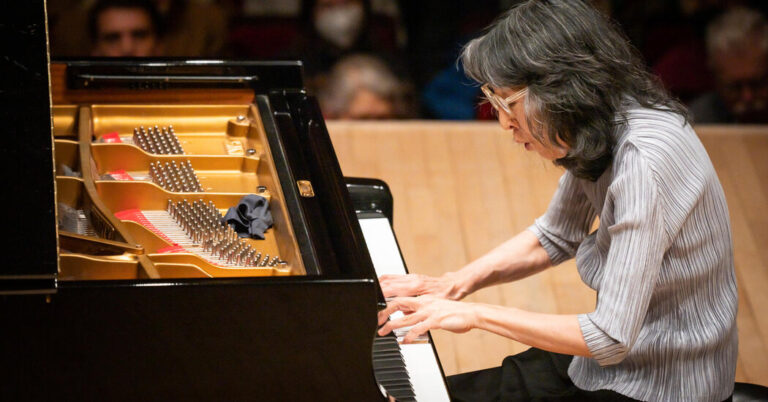
Uchida’s recording of these pieces is insistently lyrical, borderline Schubertian. The sonatas were, in her reading at the time, intimate, private musings that were made public but didn’t seem as if they needed to be. On Friday, however, her sound was often comparatively bright and extreme — the sfordanzos true explosions, the pianissimos exquisitely soft-spoken. Each sonata unfurled with improvisatory freedom, absolutely alive, its heart showing more than its head. Yet because of Uchida’s technique, her pedalwork and precision, the scores were also transparently multidimensional. You could hear, with awe-inspiring ease, every line threaded through the fugue of the Op. 110’s finale. Then and now, her playing was persuasive; Beethoven’s music can withstand, even demand, both approaches.
In her Op. 109, the Sonata No. 30 in E, the lilting vivace opening crested and fell in force — more a wave than a ripple, but, in its alluringly long line, still beating from the same source. This work, and the two others on the program, can be difficult to voice, to tease a melody from tangled rhythms and tricky fingerings; on Friday, Uchida lent just the right amount of weight to each finger to emphasize the counterpoint, revealing the architecture of the score, without distracting from the singing melodies it supports.
At times, particularly in the Op. 110 Sonata in A flat, her sound approached that of lieder by Schubert, who seemed to trade places with Bach as the arioso alternated with an intricate, three-part fugue. In Uchida’s hands, that finale — in Beethovenian fashion, a journey from profound despair to euphoric heights — achieved a kind of holy grandeur.
She reached even higher in her account of the Op. 111 in C minor. In the closing Arietta — after the straightforward theme and the initial variations on it, including one that famously swings like a glimpse of music’s jazzier future — with a lot of score left to go, she seemed to depart from everything that had come before. Her trills twinkling, her playing more personal than performative, she followed Beethoven’s leap to the cosmos and remained with him to the whispered final measure.